#Taishang laojun
Explore tagged Tumblr posts
Photo
NICE PERSPECTIVE

Another AP art piece! Honestly I wasn’t really feeling this one but it’s turned in already so ¯\_(ツ)_/¯
#journey to the west#jttw#xiyouji#sun wukong#monkey king#illustration#i draw the crucible scene way too much gfhdjkssd#chinese mythology#taishang laojun#addition
146 notes
·
View notes
Text
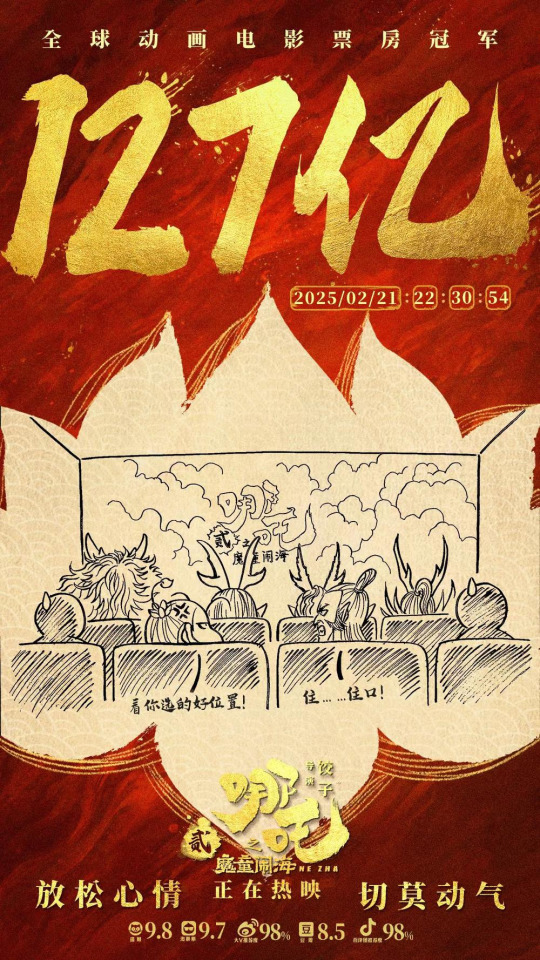
Jiaozi (Director of Nezha 2019 and Nezha 2025) does a celebratory doodle everytime the movie crosses a new milestone. This is the doodle done as of 2/21, breaking the 27.1 billion record.
Translation:
Taiyi Zhenren: Look at the 'great' seats you picked! Shen Gongbao: Shut... shut up!
Anywho, this is a retired blog, but I'm willing to come out of retirement for a day just to do a little writeup about what's going on in the Nezha 2 fandom on lofter and adjacent spaces. I've successfully cultivated immortality from looking at it all fyi. Is there any interest? Just leave a like or reply ;)
Just like the good old days when I used to share the wildest jttw discourses from c-net, things on par with "Princess Iron Fan cheated on her husband with Taishang Laojun". This is NOT about the people who happened to watch the movie, the people who are just interested in box office stats, the people who really enjoyed the movie, or the people who just really admire Nezha. This will be about the fandom fandom, the truly invested, the elaborate fanons behind certain ships that will make you go "wait what?", the rabid Ao Guang discourse that will also make you go "wait what?," the brainrot (affectionate) in its purest unfiltered form.
#nezha 2025#nezha#nezha 2#I've shared some of these 'events' with earl-of-221b#but I'm willing to share them with the handful of others too so long as it's what you want to see#because I saw a few people lament not being able to read chinese#and I know it's always more fun being able to see what other fans are cooking up- this deep dive is for Them#but disclaimer:#the contents of this writeup will not benefit your lives in any way but it has greatly benefited mine!#(shhhh then I go back into retirement and hacking away at Rain act 3)
85 notes
·
View notes
Text
The Tragedy of Bull King, Red Boy and Princess Iron-Fan
me: does a poll for people to vote on between the Daoist Mi Lore or Kingdom of the Flowing Sand rats Also me: alright imma write about something else entirely
I will be tackling the Bull King's Family lore according to Black Myth Wukong, since the devs did change some things from the original JTTW books + my own interpretation and thoughts. You can find my other posts under the Black Myth Rambling tag
TW: Rape, forced childbirth, suicide
Will be abbreviating some names or calling them by a different name: Bull King = BK Princess Rakshasi = Princess Iron Fan Sun Wukong =SWK Red Boy = RB Mount Lingshan = Western Heaven Celestial Court = Eastern Heaven Taishang Laojun (the furnace guy) = TSLJ Keeper of the Flaming Mountain = furnace boy
I will try my best to tell all of this in chronological order to make sense of the timeline. Some events it is not very clear if it happened before or after this and that, so I listed them up in the order that I think it happened.
Some Backstory:
Both the Yaksha Kingdom and Kingdom of Rakshasa were destroyed by Mt. Lingshan
In the past, the Yaksha King was betrayed by the celestial beings, leading to the massacre of the royal family and the downfall of the Yaksha Kingdom. After the kingdom's collapse, the yakshas were forced into exile.
Yaksha Archer journal entry
When a formidable enemy attacked, the Yaksha King appointed Mi Yan as the vanguard general. [...] Despite their valor, the Kingdom of Yaksha was ultimately destroyed, but not a single soldier from Mi Yan's army deserted.
Red-haired Yaksha journal entry
Along with the fall of the Yaksha Kingdom, the Rakshasa Kingdom, due to their kinship with the yakshas, also met its end.
Thunder Rhino Master journal entry
From the Sea Rakshasa Journal entry:
from the entry, we gather that Princess Iron Fan was a princess of the kingdom of Rakshasa beyond the Western sea
Kingdom fell, they escorted the princess eastwards, and made a new home in the Flaming Mountains. Strongly assuming this all happened before fire rained down to the mountain from the furnace being kicked over by SWK
Princess Iron Fan is described to have a kind heart
After her eastward migration, Rakshasi had a new Daoist master in the Celestial Court. Practicing Daoism in Buddhism's stead, Rakshasi marked a departure from her past.
also from the Thunder Rhino Journal entry
From the Keeper of the Flaming Mountain Entry
he's a bitch and doesn't give a shit about human lives lol
also hazed Princess Iron Fan
calling him furnace boy because that was literally his job in heaven lol, fanning the furnace. the same furnace SWK was cooking in for 40 days
His master is TSLJ, introduces him to Princess Iron Fan. She is his new disciple, but also furnace boy's senior. He calls her 师姐 shī jiě, with jiě meaning 'older sister'.
which, he is not happy about. and then says well since she is the senior she should be fanning the furnace.
and Princess Iron Fan being the queen she is, goes alright bet and does her job.
does NOT tattle on furnace boy. instead asks for a bigger fan because the one the boy gave her is too small.
and old man gives her hher signature Iron Fan.
Enter SWK, who springs outta the furnace, and flames fell down to Earth creating the Flaming Mountain.
Furnace boy is demoted to Keeper of Flaming Mountains
Iron Fan volunteered to go to mortal realm to help him. what a queen he did not deserve her
he learns then that the princess already has a cave where she chills and loyal followers (the Sea rakshasa)
TSLJ arranged the marriage between her and BK
realizes no matter how many dirty works he does for TSLJ, his master will never think furnace boy is worthy to be with her LOL. even his master knows what a trash he is
So we know that Princess Iron Fan and BK got married after SWK jumped out of the furnace
Here is a pic of Princess Iron Fan. Ain't putting one of Furnace Boy because he doesn't deserve it
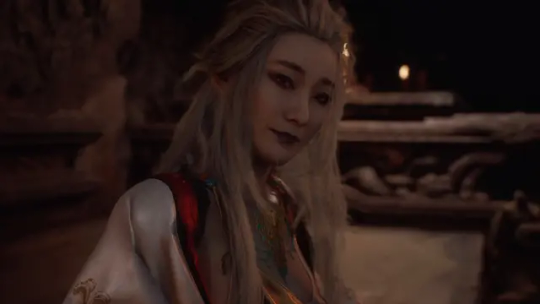
The Yaksha King Lore
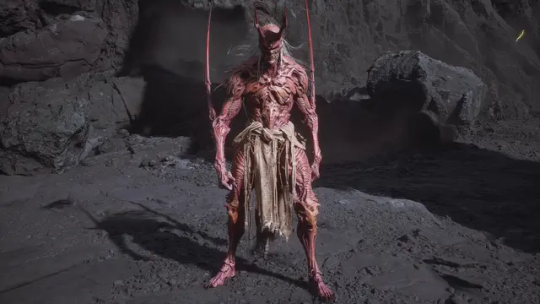
2nd phase of the Red Boy final boss battle in chapter 5.
Journal entry does not talk about the RB though, rather talks about the Red Boy's bio father. yes folk that's right, BK is not his bio dad in BMW
Mt. Lingshan wages war against the Yaksha Kingdom. Mount Lingshan is where Buddha resides and the final destination of the pilgrims in JTTW to retrieve the scriptures.
Yaksha King's son, a baby, recently died. Father is still carrying the infant in his arms. The King himself is gravely wounded
creepy ass dude shows up and is like "yeah I can help you to carry on your royal line and save your son, trust me bro"
"Whether the Yaksha royal lineage continues or ends depends entirely on your decision today." [...]
they extract the dead baby's soul into a red lotus flower before it could enter the cycle of reincarnation
They also need the life and the water of child-bearing river in
The figure clapped, and a white-clad Daoist emerged from behind. The Daoist approached the Yaksha King, bowed, then sat cross-legged on the ground. He extended his hands above the boy's head and began to chant softly. Before long, a small, blood-red lotus flower emerged slowly from the boy's forehead, crystal clear and vibrant. The Daoist carefully plucked the lotus and placed it into a bowl he carried. The Yaksha King fixed his unblinking gaze intently at the lotus. The figure said, "This red lotus is the essence of your son's soul. To ensure it does not dissipate before successful reincarnation, we will need your life and the water from the River of Childbearing."
White figure is Furnace Boy and his master is TSLJ. probably also what furnace boy refers to doing his master's dirty work
This is the same way Red Boy kills himself at the end of chapter 5, thus ending the royal Yaksha lineage
Here is an image of Red Boy
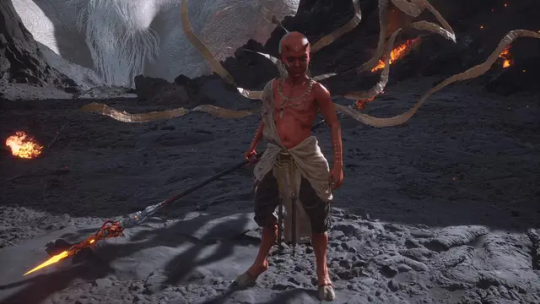
Princess Iron Fan was forced to drink the child-bearing water and give birth to the Red Boy
BK and SWK are sworn brothers, and he aids him fighting against the court, before SWK rebellion in heaven and was buried under a mountain for 500 years
We learn in the chapter 5 ending animation, that she was forced to drink from the water and give birth to Red Boy. BTW Highly recommend watching the ending animation




The way I understood this scene is that if it wasn't SWK, none of this would have happened, hence I believe they forced her to do it as a punishment for BK and probably to also keep his family in check
Princess Iron Fan says herself that carrying and giving birth to this child gave her a lot of pain, toppled with the fact that her husband doesn't really look at her anymore and pretends he doesn't know about Red Boy's origin and just overall keeps his distance. They still had a good relationship though as father and son
She still loved Red Boy very much and raised her like a son
"I ordered you to raise a child, but I did not ask you to be a true mother. Let the boy stir his trouble; as long as you and your husband stay out of it, you will be safe."
From Princess Rakshasi journal entry
Princess Iron Fan mentions that if the truth about Red Boy's origin gets exposed, the whole family is doomed. so yeah imo that's another thing pointing towards the court trying to control BK
This is also where Furnace Boy says that when Red Boy grows up, he is the living proof of the genocide that the Mount Lingshan committed ("He will be living proof... of the dark deeds of Mount Lingshan..")
TL;DR Western heaven destroyed the Yaksha and Rakshasa Kingdom, Eastern Heaven swooped in to claim the soul of the last Yaksha royal as blackmail material
BK has a fox lover, with him he conceives a child too: Pingping. We love Pingping, she has never done anything wrong in her life. We never meet the "real" Pingping in the game rip
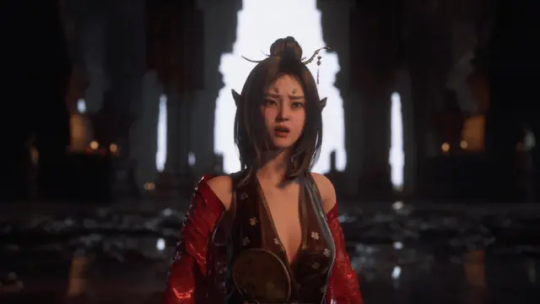
Gang arrives, SWK wants to borrow the Iron Fan to get rid of the fire (his fault they rained down there btw LOL)
Princess Iron Fan was ready to hand out cause she knows if she doesn't there will be problem
Bull King cannot decide whose side to pick, which I guess demonstrate his indecision here, and also no choice is still a choice, which in turn turns into a bad one in this case here
Red Boy says no fuck that you can't have it. gets his ass beaten by monkey, and is then sent to be a disciple under Guanyin along with Black bear guai
Princess Iron Fan seeing her sweet sweet boy beaten refuses to hand out the fan now, gets attacked by the King.
The fox mistress is killed by Zhu Bajie
SWK tells him he should find a master to serve
BK pissed at how his wife and mistress were treated, lashes out.
Heavenly Court gets involved in the battle, Nezha subdues BK and beheads BK but don't worry he is not dead
BK is taken to heaven, converts to buddhism, serves heaven and then returns home
Pingping lives with Princess Iron Fan
enter the happy family era
From that day on, the Bull King's temperament changed drastically. His former wild and unrestrained nature was no longer seen. He declined all invitations, ceased his travels, and instead stayed in Flaming Mountains, helping Rakshasi with household affairs and training the bull soldiers, living a very peaceful life.
Bull King journal entry
red boy then also returns from Guanyin and they live happily together as a family of four for some time being
The he get summoned by the court to fight against SWK. by that tiem SWK has already attained buddahood, realized it's not for him and went back to Mt Huaguo. The heaven was not happy about that
SWK warns BK to not absorb the artifact, because that will fuck him up.
BK swallows the artifact, becomes depressed
At some point Red Boy also learns the truth about his origin, and demands the BK give him the artifact so he can take revenge on Heaven and avenge his bloodline
BK refuses
Red Boy wages war against BK
he also knocks out Pingping so he can take her form to mess with SWK and get the artifact from BK
and then pretty much everything from Chapter 5 happens, Red Boy's army fighting against BK's Army. BK himself is sitting depressed on the mouintain, injured and looking very skinny. We defeat Red Boy, BK spits out the artifact, Red Boy was not defeated and gets the artifact and aborbs it, turning into the Yaksha King
MEANWHILE our QUEEN Rakshasi tries to get help from her master and Buddha to stop the fight between father and son
she went to her master TSLJ, who is a dick and said. just let them do whatever, didn't ask you to raise the kid as your own son anyway. You just needed to give birth
she knows her son well and knows that the only way the siege would end is if he would die
Then goes to Mt Lingshan, to get revenge, carrying her fan, but she was not able to get revenge and is laughed at by everyone
A booming laughter echoed, deafening. Within that laughter, she heard the cries of an infant, the innocent giggles of a child, the roars of an adolescent, and the cycle of blooming and withering flowers, the growth of grass and the flight of orioles over millennia. She heard the embers extinguishing in the Flaming Mountains.
From her journal entry
so she senses that her son lost the battle or is close to death, so she rushes back home, like the fantastic mom she is
You can watch the cutscene here starting at 28:30 - highly recommend watching it to the end
She is begging DO to spare her son's life, and in return, she and her whole family will go into secluded meditation (exile?) and he can have her fan
Red Boy, refusing to be shackled and chained again, kills himself the same way the Yaksha King killed himself
we still get to keep the iron fan LOL
My thoughts and rambling: This whole family story is one fucking tragedy after another. Princess Raskshasi / Iron Fan, who lost her kingdom, moved east and then was used as a pawn by her master. Firstly wed to the Bull King and then forced to give birth to Red Boy - and suffered much pain carrying giving birth to Red Boy. It's never explained why her master set her up to marry the Bull King, but given how everyone in the famils is used as chest pieces, I strongly assume it is also a way to control BK.
Unconfirmed but this is the timeline I pieces together in TL;DR
SWK jumps out of the furnace
Princess Iron Fan follows Furnace Boy to the mortal realm. Is set up to marry Bull King
Bull King aids SWK in fight against the Court
SWK loses against Buddha of the West, is buried under the mountain
Princess Iron Fan has to drink the pregnancy water and gives birth to Red Boy
They used his wife as punishment for his action
While it doesn't sounds like it is a marriage out of love (which, to be fair not a lot of marriages back then were), I do think that both Bull King and Princess Iron greatly cared for each other. I'd say even boldly that Princess Iron Fan cared more LOL because Bull king had a mistress with whom he had a child. It can be argues that because he knows Red Boy is not his, he seek solace in the arms of another woman (and then has another child with her.
Princess Iron Fan has like every reason to turn into an evil stepmother or bitter woman, but she didn't.
Bull king has never made a right choice in his life, according to SWK
SWK and BK vs the Court
SWK and the court vs BK
the court and BK vs SWK
And the Red Boy... last of his lineage and used as a pawn by the court. Also interesting to note that in his design, he looks half "human" half bull, with his lower half being the bull part.
Overall another tragic love story in BMW.
And that's it from me, thank you for reading!
#black myth rambling#black myth wukong#bull king#princess iron fan#princess rakshasi#red boy#sun wukong
36 notes
·
View notes
Text
Legend VS LMK Characters:
Kui Mulang (LMK):
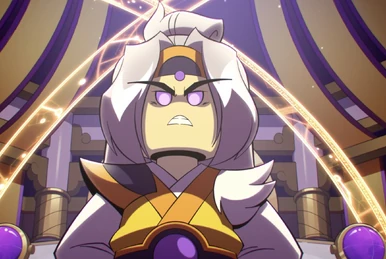
[Kaui Mulang, Guard of the Celestial Court, Mansion of the White Tiger, Devourer of Earthly Souls]
Korean: Gyumokrang Mandarin: The Wood Wolf of Legs
Former Celestial Guard turned Yellow-Robed Demon.
After Falling in Love with Jade Maiden and having their love rejected by the Celestial Realm. He gave up their immortality and he awaited for her to reincarnate. As he waits to make sure he will be there to see her he consumes mortal lives to longavit his own.
The 28 Mansions mentioned by him are part of the Chinese constellation system as to why there is so much star imagery is in his castle.

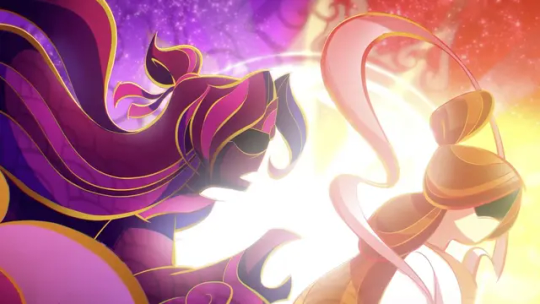

Kui Mulang (Ledgend):
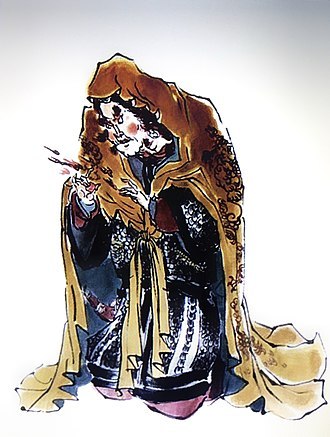
Kui Mulang originated from the ancient Chinese worship of the constellations, a spiritual practice that combines Chinese mythology and astronomy. He is considered to be one of the 28 Mansions, which are Chinese constellations. These are the same as those studied in Western astrology. He appears in Chinese mythology literate notably the JTTW & Fengshen Yanyi.
He is linked to a historical figure called Ma Wu, a general who hailed from the town of Huyang in Tanghe, located in the Henan province.

Kui Mulang is associated with the constellation Andromeda, which appears in the sky in the middle of November. In this constellation is Kui Xiu, described as the "four-legged fish palace" of Heshansu (和善宿) because its shape is similar to a fish. Another constellation, the White Tiger, is also associated with this cluster of stars.
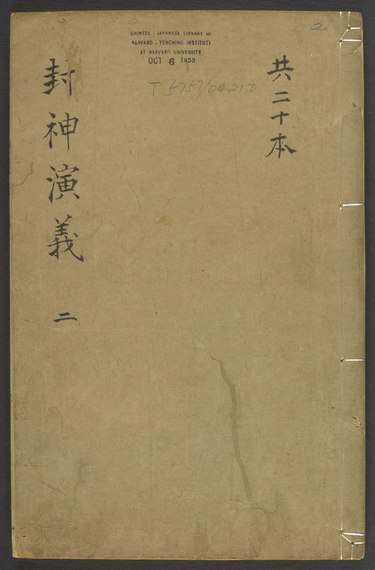
According to the novel Investiture of the Gods (Fengshen Yanyi), Kui Mulang was originally named Li Xiong. After he died in the Battle of the Ten Thousand Immortals, Jiang Ziya deified him as the Wood Wolf of Legs, one of the twenty-eight stars.
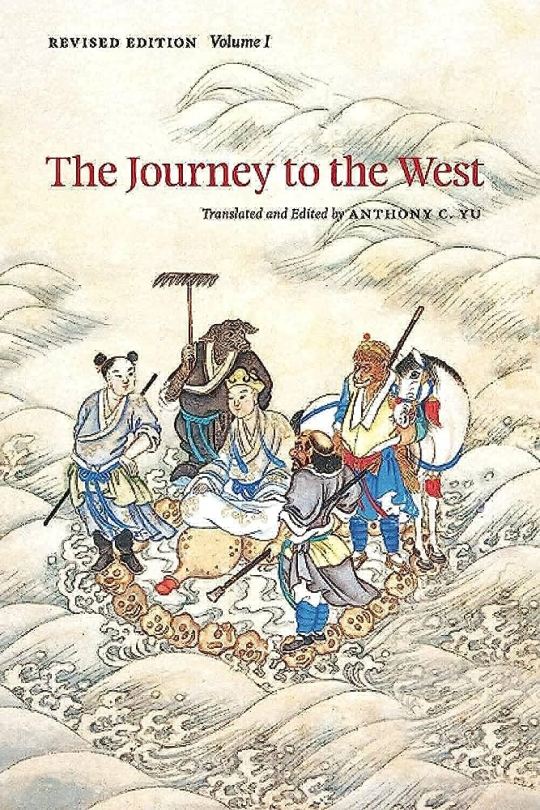
In JTTW
Kui Mulang appears as a demon named Yellow Robe Demon . He lives the Moon Waves Cave on Bowl Mountain in the Kingdom of Baoxiang. In his past, the Yellow Robe Demon falls in love with the Jade Maiden in Heaven and decides to elope with her. He becomes a demon lord and the maiden is reincarnated from a goddess to a human who is named Baihuaxiu . She is the third princess of the Kingdom of Baoxiang. The demon then kidnaps the princess, though she has no memory of her existence as a Jade Maiden. He marries her and the couple has two children. Sun Wukong manages to defeat the demon, which mysteriously vanishes after his defeat. Wukong then seeks help from Heaven to track down the demon and learn his true identity. The Jade Emperor discovers that one of the 28 Mansions is missing, so he orders the remaining 27 to subdue the demon. The demon is revealed to be a disguised as Revatī, the Wood Wolf of Legs, a star deity in the heavenly court, and one of the 28 Mansions. The Wood Wolf is then subdued and brought back to Heaven. As punishment, he is ordered to become a furnace keeper under Taishang Laojun.
Jade Maiden:
Considering she is a huge part of Kui Mulang's life I thought maybe also some info about her as well.
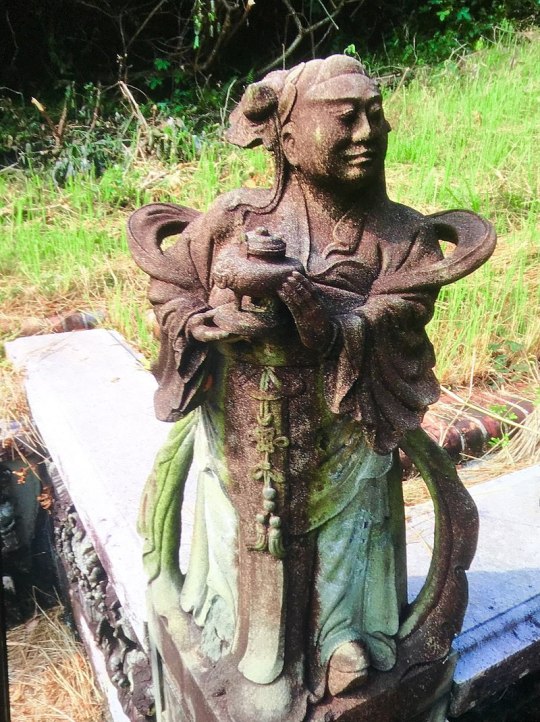
[ Yunü / Jade Girl or Jade Maiden]
Yunü is a common designation for a beautiful woman or, in Daoism, for a fairy or immortal
A Taoist deity or goddess in Chinese mythology and Chinese traditional religion who, along with her male counterpart Jintong (Golden Boy), are favored servants of the Jade Emperor and Zhenwudadi.
They are also believed to serve as guides in the underworld and the protectors of houses and temples. Some of the Golden Boy and Jade Girl pair could be found on some graves at Bukit Brown Cemetery as they are believed to serve as guides in the Spirit World or the Underworld.
During the spring festival, pictures featuring the two can be found on the doors of many households.
This couple helps virtuous souls over a golden bridge to paradise and helps souls whose good deeds outweighed the bad, over a silver bridge to paradise. Therefore by erecting the Golden Boy and Jade Maiden by the grave of the deceased, living family members hope that the deceased will not venture into the courts of hell but instead lead their afterlife in paradise. Yunü and Jintong have appeared in several stories since the Song and Yuan dynasties and have become important figures in Chinese mythology.
There are several mountain peaks bearing her name.
In Journey to the West, Yunü is a servant maid of the Jade Emperor in Heaven. She falls in love with a star god called Kui Mulang and decides to elope with him. However, she doesn't want to ruin Heaven's pureness, so she decides to reincarnate as a human. She enters the human world as Baihuaxiu, the third princess of the Kingdom of Baoxiang.
In Other Literature:
Specific examples are the southern opera version of the legend, Jintong and Yunü, In this context, Yunü is called Longnü and Jintong is called Shancai Tongzi. According to the Shenyijing, Yunü and her companions loved to play touhu, a Chinese game in which arrows or darts are thrown into a vase. In the Avatamsaka Sutra, she and Jintong seek enlightenment and are acolytes of Guan Yin. In this context, Yunü is called Longnü and Jintong is called Shancai Tongzi. Some folktales say that Xue Dingshan and Fan Lihua were originally the Golden Boy and Jade Girl. The Jade Emperor was furious with them and wanted to punish them for breaking the celestial utensils. Fortunately, the Old Man of the South Pole begged for their mercy and was demoted to the mortal world. In the Hanyi ji play, the protagonists Qi Liang and Meng Jiang are reincarnations of Jintong and Yunü. In most popular versions of The Butterfly Lovers, the protagonists Liang Shanbo and Zhu Yingtai are human reincarnations of Jintong and Yunü who are expelled from Heaven Court by Guanyin or the Jade Emperor for their sin and forced to live as a thwarted couple for three or seven generations before being reunited and restored to their original status.
Thoughts:
Yunü has a lot of love and being kicked/leaving heaven tales.
But did love she was more than just known for this story alone.
The JTTW and LMK versions of Kui Mulang are not too different. However, in the retelling of their love tale he only mentioned himself ridding them of their immortality it almost sounded like in that tale she might have had second thoughts and he did it by force. But I hope not but we can never know because the LMK changed a lot of the characters and tweaked some backstories.
I think the real change in the LMK is that Kui Mulang captured Ao Lie before the JTTW. From the way he talked about the Jade Maiden, she had not been reincarnated or at least he had not captured her yet. For Ao Lie It had to be after his banishment of course because he talked about his powers causing damage he felt bad for aka when he burned his dad's stuff.
Well, I hope you, readers enjoyed:)
#lego monkie kid#jttw#lmk#fan thoughts#journey to the west#lego monkey kid theory#character study#kui mulang#jade maiden#chinese mythology
133 notes
·
View notes
Note
Great overview! I just wanted to add one thing. Yu (Wu & Yu, 2012) actually omits something about the Diamond Snare from the original Chinese. As a reminder, the translation reads:

But the Chinese states:
The year when I crossed the Hangu Pass, I depended on it a great deal for the conversion of the barbarians to Buddhism (emphasis added), for it was practically my bodyguard night and day (based on Wu & Yu, 2012, vol. 1, p. 186). 當年過函關,化胡為佛,甚是虧他。早晚最可防身。等我丟下去打他一下。
This refers to an ancient story cycle in which Laozi travels west from China and becomes the Buddha. The tale was likely created in the second-century to explain the similarities between native Daoism and foreign Buddhism. However, the story was later weaponized during the fourth-century, resulting in the Classic on Converting the Barbarians (Huahu jing, 化胡經), an anti-Buddhist polemic claiming that the religion is just a bastardization of Daoism. [1]
This idea remained current in some Daoist circles for centuries. For instance, a Qing-era reprint of The Illustrated Explanation of Taishang Laojun's Eighty-One Transformations (Taishang laojun bashiyi hua tushuo, 太上老君八十一化圖說) includes an illustration of Laozi's birth as the Buddha (fig. 1).
Yu (Wu & Yu, 2012) likely skipped over all of this to avoid confusing readers.
Note:
For an in-depth discussion, see chapter six in Zürche (2007)
Sources:
Wu, C., & Yu, A. C. (2012). The Journey to the West (Vols. 1-4) (Rev. ed.). Chicago, Illinois: University of Chicago Press.
Zürche, E. (2007). The Buddhist Conquest of China: The Spread and Adaptation of Buddhism in Early Medieval China (3rd ed.). Leiden: Brill.

Fig. 1 - A print showing Laozi's early birth as the Buddha.
How does the diamond snare thing work?
Diamond cutting, from the Ming Dynasty fairy novel "Journey to the West", is the magic weapon of the Taishang Laojun. A dense white circle, also known as the golden steel ring, diamond sleeve; can change, is invulnerable to water and fire, can hit all things, collect all kinds of magic weapons and weapons, and the magic is endless. It was refined by Naikun steel, and it was also refined by Huan Dan. It has spirituality. It was used by Laozi for self-defense when he used it and used this treasure to overthrow Sun Wukong and help Erlang Shen capture him.
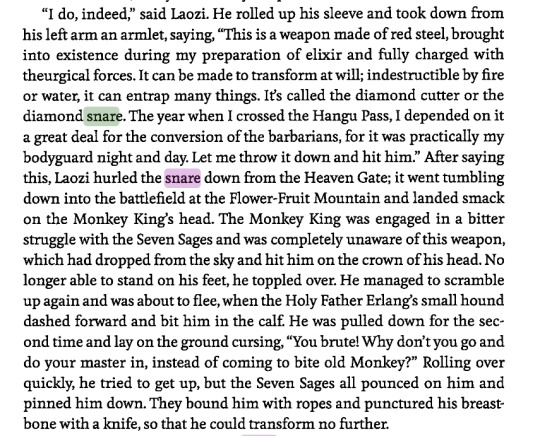
Later, it was stolen by Taishang Laojun's mount "Banjiao Qingniu", and fled to the lower realm to occupy the mountain as a demon. He called himself the One-Horned Rhino King, captured Tang Monk in Jindou Mountain. He used this treasure set to get Sun Wukong's golden hoop, the six demon-subduing weapons of Prince Nezha, and the magic weapons of all the gods and generals were taken away together, even water, fire, thunder, and lightning can be absorbed. Later, the king was subdued by the Taishang Laojun who came down to earth with a fire-type plantain fan. After subduing the green bull demon, he took back the diamond cutter and returned the weapons of the gods. Finally, the diamond cutter became the nose ring of the one-horned green bull.
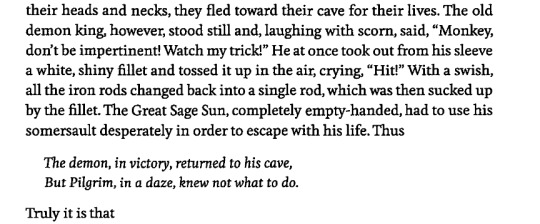

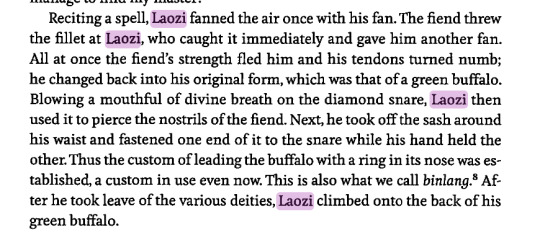
Taishang Laojun is the imperial blacksmith of the Heavenly Court. He has made diamond bracelets, purple, gold, and red gourds, mutton fat jade bottles, golden ropes, plantain fans, seven-star swords, and many other magic weapons. The diamond snare being the most powerful as he used to go down to earth and defeat Sun Wukong after the Tota King, Eighteen Arhats, and other gods in Jindou Cave. Finally, Laojun took away the gold steel bracelet with a plantain fan and subdued the One-Horned Rhino King.
https://baike.baidu.com/item/%E9%87%91%E5%88%9A%E7%90%A2/3279152?fromModule=lemma_inlink&fromtitle=%E9%87%91%E5%88%9A%E9%95%AF&fromid=10311852
#Diamond Snare#Laozi#Taishang laojun#Journey to the West#JTTW#Buddhism#Taoism#Daoism#religious politics
53 notes
·
View notes
Note
The way that Erlang's parents meet and how his mother is rescued varies a lot across traditional storytelling as seen on stage and in recitation. I'll list out the versions I found:
Taiping Geci Recitation: "Splitting the Mountain to Save Mother"/"劈山救母". Erlang lives in Heaven and spends his days hunting. He shoots down a pair of phoenixes and his grandfather the Jade Emperor rewards him with divine liquor. He falls asleep and dreams of his mother, causing him to ask the JE what happened to her. The JE weeps in shame and asks Erlang to seek out the Queen Mother of the West. She tells him that his mother married a mortal, and after having a son, washed the baby's diapers and polluted the seas. Heaven's armies were sent to capture her, but Sun Wukong shut her under Mount Tao. Erlang goes to Taishang Laojun, who tells him about Pan Gu's axe. Erlang goes into the mortal world and finds the axe has gained sentience as a demon. he defeats it and chops open Mount Tao to save his mother.
Bangzi Opera, Cantonese Opera, and Drum Recitations: "Third Princess Goes to the Mortal World"/"三姐下凡". The JE's daughters all go down to the mortal world to view festival lights. Erlang's mother meets his father and falls in love. She escapes from her chaperone, the divine general Hua Guang, and recruits the local Tudi couple to be her foster parents so she can marry Scholar Yang. She gives birth to Erlang, but the JE finds her and sends various gods to capture her. She fights all of them off except Guan Yin, who persuades her to surrender herself. JE imprisons her in the Heavenly Dungeon, where she gives birth to her daughter. Erlang grows up in the mortal world with his father and is teased by his classmates over having no mother. His father tells him about his mother's imprisonment and he goes off to rescue her. Erlang acquires divine arts, weapons, armor, and a horse from the immortal Yuding. He heads up to Heaven, where QMW warns him that JE will send out multiple trials to test his willpower. He'll need to carry two great mountains on his shoulders to capture the 12 suns standing guard over the prison. He does so and frees his mother and sister, and his sister helps him attack JE's palace and force him to agree to pardon their mother.
Han Opera: "Taoshan Cave"/"桃山洞". Erlang's mother falls in lover with a mortal after realizing they're fated to marry. Unfortunately, Yuan Hong's (the monkey demon from FSYY) sister also believes she's fated to marry Scholar Yang. Erlang's mother recruits the local Tudi to help her do some tricks with an old tree that gets Scholar Yang to agree to marry her. Sometime after their wedding the monkey demoness attacks and tries to abduct Scholar Yang. Erlang's mother fights them off and carves her name onto the demoness's face. The demoness runs back to her brother, who attacks Erlang's parents in revenge, but is also beaten back, and during their battle, Erlang's mother brags about her name. Yuan Hong reports her to Heaven and gets help from the Dragon Kings and other gods to capture her. Erlang's mother entrusts her baby son to Taishang Laojun, and the united forces of demonic immortals and gods capture her. Yuan Hong shuts her beneath Mount Tao, where she gives birth to a daughter. Erlang grows up with Yuding. He eats special ox, tiger, and dragon buns, as well as peaches of immortality, then bathes in a mortality-shedding pool to gain his powers. He arms himself and goes to Mount Tao, where he defeats the demons and his dog kills the monkey demoness. He rescues his mother and sister and they head home to reunite with their father.
Puxian Opera: "Third Princess Goes to the Mortal World"/"三姐下凡". Basically the same as Han Opera, except Erlang's mother's rival is a dragon princess. Erlang is considered a freak by his father for having three eyes and given over to Yuding. After Erlang's mother mutilates her rival, the Dragon Kings fight her and imprison her under Mount Tao. Erlang's father is abducted and imprisoned under the sea for refusing to marry the mutilated dragon princess. Erlang grows up and besieges the Dragon Palace. The mutilated princess's younger sister comes out to fight him and they fall in love. She makes peace between him and her family and they free his father. Erlang goes to Mount Tao, where he frees his mother and sister. Their family is reunited.
Hunan Huagu Opera: "Zhang's Second Girl Goes to the Mortal World"/“张二姐下凡". Erlang's mother is the Second Heavenly Princess. She reads some Heavenly Scrolls and notices that two gods are yet to be born and decides to be the one who gives birth to them. She picks as her husband Scholar Yang, who's already married to a woman named Zhao Meirong. She takes Meirong's form and tricks Scholar Yang into believing Meirong is a demon. Meirong goes home to her father and brothers, who are outlaws that rule a certain mountain. Her father has Taoist arts and lights special incense to summon the gods and report this strange matter. The gods discover the Second Princess's identity, but even after having her children, she refuses to leave because she's truly fallen in love with her mortal husband. She is captured and shut under Mount Tao. Erlang is abandoned in the mountains and saved by Yuding. The second part is called "Splitting the Moutain to Save Mother"/"劈山救母". When Erlang grows up, Yuding sends him to a renowned swordsmith couple to forge him a blade that can split mountains. The raw material must be the Ox-King's horn and the fuel must be the essence of golden coal from Mount Mei. Erlang takes the form of the Jade-faced Fox, seduces the Ox-King, and saws off a horn while he's drunk. He then fights the spirit of the Golden Coal. She falls in love with him and willingly sacrifices her essence to fuel the forge. Erlang splits the mountain and saves his mother.
Teochow Opera: "Third Princess Goes to the Mortal World"/"三姐下凡". Erlang's mother goes to Earth to fight a three-headed demon dragon and his lackey, a dog demon. She falls in love with Scholar Yang in the process and takes the form of a huntress to marry him. They have a son. She is summoned back by Heaven and imprisoned under Mount Tao for forgetting her mission. Like in the Lotus Lantern stories, Erlang's father remarries and has another son. The brothers kill a classmate by accident. Erlang's brother is handed to the authorities while Erlang escapes and studies the immortal arts. He finds the very demons his mother was hunting now have their base over her prison. He defeats the dragon, turning him into his spear, then defeats the dog and turns him into his pet. He frees his mother and discovers he has a sister.
Thank you! I'm not familiar with operas at all, so this is a valuable list to people who want to know more about the other variants of Erlang's mom-saving stories out there, outside the premodern ones from the Lotus Lantern Summaries!
25 notes
·
View notes
Text
A Musing on Requesting Help from Lord Lao

in Livia Kohns introduction to the The Yellow Court Scripture Volume One: Text and Main Commentaries (Huangting Jing 黃庭經) she mentions how adepts of the Shangqing School of Daoism (predecessors of Maoshan) would prepare to chant the Huangting Jing. They do so by petitioning various Gods for aid and support-- mainly Lord Lao (Taishang Laojun 太上老君 ). This ancient idea of requesting help in chanting, or in my practice, spells and cultivation is something that has survived to this day, and is quite frankly, a beautiful preliminary rite.

I theorize and question why members of the Shangqing school would request help from the Gods to aid them in their chants and other religious activities. My conclusion: Even members of the Shangqing school knew, that we alone are not enough to beget magical transmutations. The Gods must aid us in our magical, religious, and mundane pursuits. We must have sincerity in our hearts, become as passive as possible, utilize the emptiness within us, and request to allow the Gods into our lives and work through us. Doing so, allows us to be a reflection of the Gods in all esoteric and exoteric endeavors. We become the Gods and the Gods become us. Such is what the petitioning the Gods and Divinely mapping them to our bodies is about!
Zhaungzi 23.17.1-2: Master Lao said, “How hard and anxiously you’ve worked at cleansing yourself! But your inner self so overflows with it that you still have what’s bad in you. When one’s outer is fettered, even the utmost dexterity fails to control it, so this blocks the inner; when one’s inner is fettered, even the tightest grip fail to control it, so this blocks the outer. If the inner and the outer are thus fettered, even [one who aspires to] the Dao and its Virtue fails to control them, so how less likely can one who conducts himself apart from the Dao!”
This quote from the Zhuangzi (translated by Lynn) gives way to passivity, sincerity, and emptying oneself to ultimately, as the Sangqing and by extension, Maoshan would have it, becoming vessels for the Gods to allow us to move with Ziran and Wu-Wei. Exercise and display Virtue all you wish, but if you are not empty inside to truly embody Virtue, you still have gunk in you. Try to use control and impose yourself and force the Gods to aid you; this fetters the outer and will bring calamity upon you. Having your inner unfettered, meaning becoming vastly empty and void, allows room for the Gods. Having your outside unfettered, the Gods aid you in your religious pursuits, and thus will position you in Ziran, and thus the self, family, and community will eventually sort itself out and abide with Ziran as well.
Dao De Jing 70 “Those who understand me are rare, and so, those few I treasure. It is for these reasons that the Sage wraps himself in coarse cloth while concealing jade in his heart."
To understand Laozi is to ask for His help, in my opinion. In doing so, your outer is unfettered and thus not displaying Virtue biasedly, but rather Virtue is displayed as Heaven displays its beneficent Virtue, humbly -- unbiasedly. This is a reason for dressing, and appearing humble. Concealing the Jade in your heart means to fast the heart-mind. Emptying the essence of your heart so that you make use of the Gods, specifically for this post, Lord Lao, the ontologically highest God under Dao inexhaustibly.
I cannot help to bring up some passages from the Liezi that I think give philosophical backing to this idea of "requesting help from Lord Lao (and all the Gods by extension).
Liezi 2 (translation AC Graham): 用志不分,乃疑於神. "Set your will on one aim, and be equal to the gods!"
Liezi 4: 在己无居,形物其箸,其動若水,其靜若鏡,其應若響。"If nothing within you stays rigid, Outward things will disclose themselves. Moving, be like water. Still, be like a mirror. Respond like an echo."
How else does one be equal to the Gods? How else can you alone move like water, be still like a mirror, and respond like an echo? Ask the Gods for assistance! Prayer. Ritual. Visualization. Divine Landscaping the Gods into your body parts! Become the Gods and They become you, in so much as one has capacities to do so. Some have more capacity to become like the Gods, and others less. No one though is completely devoid of becoming like the Gods, and I believe we all should try to strive to become like our Gods, whether you are a Daoist, Christian, Hermeticist, or whatever.
What I am not suggesting is that by doing a Request the Master Spell (Lord Lao is the main "Master" here) will numerically equate with Lord Lao in any capacity. But it will allow you to reflect the qualities of Lord Lao in so much as each individual is capable of, and how it accords with their human nature (xing). Requesting the Master will allow you to bring true power to your inner practice: magic, your cultivation, religious chants, etc. This in turn allows you to outwardly move like water and respond like an echo (Ziran). That is your outward practice...which I think naturally begets one to live like a Confucian...but that is another post for another day once I've studied more (Neo) Confucianism. ;)
I cannot help but assume the Shangqing school had passages such as these in their minds when developing such preliminary invocations to petition the Gods for their magical and religious pursuits. So, how does one go about "Requesting Help from Lord Lao" to aid in their cultivation or other magical and religious pursuits? In @Chinesemagick's (on twitter/x) book Practical Chinese Magic https://www.amazon.com/Practical-Chinese-Magic-Jason-Read/dp/191415312X, we see a certain "opened-door-method" for requesting aid and permission from Lord Lao to aid and assist us theurgist and cultivators. Complete with how to properly set up an altar to Lord Lao, the proper offerings and placements, spells, and proper mudras.
The reason for such requesting and aiding in spells, chants, and the like is to build an ancestral connection with Lord Lao. Simply doing Daoist spells or cultivation methods is just not enough. Others may feel differently and have anecdotal experience to suggest otherwise. More power to them; sincerely, Gods bless them! They should trust the essence of their heart and experience. There is a path for everyone. This is just one path. The Dao of Maoshan. One's inner power is not unlocked just by simple cultivation meditations or chants. At our basest self, we have no real magical power. Connecting to a train of transmission, to the Great Master Lord Lao is what allows the adept to unlock their own inner power to truly cultivate different Qi's, place certain Gods to parts of the body, and thus transmute your own gunk into something either fearful and powerful, or something pleasant and helpful -- you get to choose and act accordingly.
To connect to the ancestral powers of the Master -- such is a fundamental step before any cultivation must begin. It took me 20 days to just get the Request/Permission method I was taught with any sort of efficacy -- then I knew I was ready to cultivate Golden Light (Tian Qi). Then, with the help of this most Precious God, I am beginning to, slowly but surely, transmute some baseness of myself. It's a two-way street. The Gods cannot do all the work for you, but you cannot do all the work either. Be One with the Gods, be One with Dao, for it is all One.
***I do not speak for Shangqing, Maoshan nor the author Jason Read whose book I linked. I speak for myself, and myself only!***
天人合一 tiānrén-héyī “Heaven and Man are One.” 福生无量天尊 fú shēng wú liàng tiānzūn “May the immense blessings of Heaven go forth with you.”

7 notes
·
View notes
Note
THE DREAM IS BACK!!!
Anyway so Nezha tuns down the offer for top surgery because she's got morals and standards, and is not about to let the Lady Bone Demon have the ink scroll for a pair of boobs, so the Lady Bone Demon doubles down and offers her top surgery, bottom surgery AND estrogen, and obviously Nezha can't resist that offer, so she hands over the memory scroll and gets her tits and stuff.
Meanwhile, everyone is really fucking tired of the snakes, because at this point there's a hundred or so of them, and Macaque is so tired he just starts stomping them out. And everyone else is horrified because bro wtf this is a kids show you're gonna up the rating, but it's okay because instead of regular blood we got the neon pink paint splatters. And Xiangliu is so horrified by this that he calls the snakes back to him because those are his BABIES YOU CAN'T KILL HIS BABIES.
Anyway the crew gets his ass and they go to lock him up in a dungeon, only to find out it's not a dungeon and is in fact Erlang Shens palace(Idk bro). And Erlang Shen is super confused because why tf are all these people here in his house. Also Xiaotian Quan mauls Xiangliu off his feet. So Wukong explains the situation to Erlang because they're on good terms and Erlang helps them put Xiangliu into an actual dungeon. While they're carting off genderbent race swapped Medusa, they run into Nezha post surgery, and they all think she's looking a little different but they can't really tell, so Mei tries to ask if she got her hair cut and Nezha stomps off because COME ON PEOPLE. It's not like she totally forgot to come out or anything.
So the crew is still confused by they put Xiangliu into a cell, and Erlang decides he'll just go check on Nezha because who knows, maybe she's just having a bad day, and he catches Nezha getting her estrogen pills from the Lady Bone Demon, but he doesn't know what estrogen is, so he assumes that the Lady Bone Demon tricked Nezha into taking drugs. So like a good general whose concerned for the wellbeing of his soldiers, he goes and snitches to the Monkie Kid crew, who are all varying degrees of the surprised pikachu meme.
Now, Sandy thinks they should stage an intervention as Nezhas friends, Macaque thinks they should mind their own business, Wukong is wondering why the Lady Bone Demon never gave the others free drugs, Redson thinks they should tell Nezhas dad(and is immediately booed off the stage) and MK and Mei conspire to catch Nezha in the act.
So MK and Mei learn to cook crack and follow Nezha around trying to get her to buy it from them(in disguises) and Nezha is just really confused because who thinks it's a good idea to sell crack in the Celestial Realm and she doesn't even want drugs??? Eventually she does find out that it's MK and Mei and she's just even more confused, so she just leaves them in the hallway as she has a crisis.
Eventually they do decide to stage and intervention, and after Erlang and Wukong wrangle Nezha onto Sandys boat, everything comes to a head. They're not very good at the whole intervention thing, and Sandy and Pigsy try to keep it friendly, telling Nezha that they're worried about how distant she's been, and Nezha starts yelling about how she's just tired of them constantly belittling her and disrespecting her wishes, and how she wishes they would just like her be a woman, and EVERYONE gets confused at that, because again, NEZHA FORGOT TO COME OUT. So she does come out and everyone is just glad that she's not taking harmful drugs and just getting HRT, but she's still in trouble from getting her stuff from the Lady Bone Demon, because girl wtf????? Coulda gotten free surgery and pills from Taishang Laojun but sis is out here putting the realms in danger for it smh.
Bro my ass was eating this shit up like a five course meal
My wife is so for real for that though but the thought of everyone assuming she's taking drugs is hilarious thank you for feeding me nonnie
3 notes
·
View notes
Text
I guess the new guy is supposed to be Daode Tianzun/ Taishang Laojun? He's a high Taoist god and member of the Three Pure Ones. It's believed he can control the future.


21 notes
·
View notes
Note
Hello!!! Stumbled upon this blog on a casual scroll-through and am super impressed at how thorough and passionate it is!! Kudos!!
I had a question, if it’s not too much of a bother:
Is there any sort of artifact mentioned in JTTW (or Chinese mythology at large) that’s been used to contain a yaoguai’s power/take it away from them? Maybe in the vein of Guanyin’s vase? Sorry if this doesn’t make sense.
So what you are asking for is something that can take away cultivation so to speak? There are some tv/movies that do show other yaoguai that are able to eat the life force of yaoguai and forcing them back into their original state therefore taking away their power and their humanoid form.
However that is more popular in modern media, as for any canon items they are more focused on subduing and capturing rather than depowering.
Gaunyin's vase sadly hasn't been able to show any depowering abilities either if you were asking about that. It has been show to whole an entire ocean and that it can hold healing water. But there are movies where she is able to capture demons (such as Wukong) in her vase and keep them in a state of status. But I don't know how in canon that is as she does have a lot of history outside of journey to the west.
But on to magical items in journey to the west! I shall rank them from most subduing to least subduing
Subduing Buff Attacking
Golden Jade Ring (金剛琢) - it can change size, is invulnerable to water and fire, can strike all things, collect various magic weapons and weapons, and has infinite uses. Laojun used this treasure to knock down Sun Wukong and help Erlang Shen capture him. The One Horned King used this treasure to take away Sun Wukong's golden hoop, Nezha's six weapons, and the magic weapons of hundreds of gods and generals. It can even dissolve water, fire, thunder and lightning. Later, Taishang Laojun, who came down to the world himself, defeated it with a fire-type banana fan. This was the thing that put Wukong stop in his tracks, doesn't take away power but def the most powerful.
Flask of Yin and Yang Essence (陰陽二氣瓶) - it contains the Seven Treasures and Eight Diagrams, twenty-four Qi, and requires thirty-six people, according to the number of Tiangang, to lift it. This treasure can hold a person and if a person does not speak, the bottle will be very cool. But once they speak, fire will burn them into pulp water in a moment. Wukonghad to use his Golden Hair he was given by Guanyin to escape. While not invincible it took another magical item to counteract it and thus very powerful.
Golden Cymbals (金鐃) - the magic weapon used by the Yellow-Browed Monster who trapped Sun Wukong inside and would have turned to puss inside it if he didn't escape. Sun Wukong escaped from the golden cymbal with the help of Kang Jinlong and immediately broke it. Took nearly an army to escape it, very powerful.
Purple Gold Red Gourd (紫金紅葫蘆) - as long as you call out your opponent's name if they respond, the elixir will pull them inside. Then a note with the words "The Supreme Lord Laozi, please obey my command as soon as possible" will be posted on it, and the elixir will turn into pus in a few hours. Hard to say how powerful this is since Wukong escaped it twice turning into a bug so... take that as user error or not.
Human Sack (人種袋) - Sun Wukong invited the twenty-eight constellations, the two generals of the tortoise and the snake, the five great dragons, Prince Xiao Zhang and the four great generals, but they were all put into the monster's bag. Later, Maitreya Buddha took back the human seed bag and put the demon king into the bag. Very powerful but does not kill, so less of a threat.
Golden Cloth Rope (幌金繩) it was originally a belt used by Taishang Laojun to tie his robe. It has a tightening rope spell but also a loosening rope spell and if a user knows both they most likely will not be affected. Powerful but if you know the loosening spell it is useless.
Suet Jade Flask (羊脂玉淨瓶) this was used by Taishang Laojun to make elixirs and hold water. It has space inside to hold water from all over the world.
Seven Stars Sword (七星劍) - the real sword from the Ming and Qing dynasties that has survived in modern times was used by Tan Sitong. The seven stars are mainly symbolic, but from the perspective of material mechanics, they should have the function of buffering stress concentration and preventing the sword from breaking.
Palm Leaf Fan (芭蕉扇) - The two banana fans, yin and yang, are held by Taishang Laojun and Princess Iron Fan respectively: the banana fan used by Taishang Laojun is yang, and the six Ding divine fire it fanned is the power source of the alchemy furnace; the banana fan used by Princess Iron Fan is yin, and its water vapor can extinguish the fire in Huoyan Mountain. The two fans are mutually reinforcing and mutually restraining. There are prototypes that can be traced in reality.
Banana Leaf Fan (芭蕉扇) - The extremely yin treasure fan can fan out water vapor, and water can extinguish fire, so it can extinguish the 800-li Flame Mountain. "Journey to the West" Chapter 59 "Tang Sanzang's Road Blocks the Flame Mountain, Sun Xingzhe Uses the Banana Fan" "...Her banana fan was originally a magical treasure created by heaven and earth since the beginning of chaos behind Kunlun Mountain. It is the essence of the Taiyin, so it can extinguish fire." The yin wind fanned out can make people drift 84,000 miles before it can stop.
Purple-Gold Bells (紫金鈴) - This Purple Gold Bell was forged by Taishang Laojun in the Eight Diagrams Furnace, and it is very powerful. Shake it once, and fire will come out. Shake it twice, and smoke will come out. Shake it three times, and sand and rocks will fly. Sun Wukong stole the golden bell and then subdued "Sai Taisui".
If you are looking for more magic items that can take away cultivation I actually think that there is something in FSYY that took away some daoists' cultivation... but I think that was more of a formation than an item... I'm sorry I didn't take notes on but that novel DEF has a lot of magical items!!
#anon ask#anonymous#anon#jttw#journey to the west#xiyouji#ask#investiture of the gods mentioned#high key rec trying to find a list there#though i think that would be hard to find#the book is kinda long and boring but a lot of neat stuff
54 notes
·
View notes
Text
On what grounds does Lü Dongbin hold a status in Taoism second only to the Supreme Old Lord?
There is an extraordinary figure in Taoism. He is neither an innate deity like the Taoist Patriarch Taishang Laojun, nor the founder of a Taoist sect like Zhang Tianshi, nor even a patriarch of a Taoist sect like Tao Hongjing. However, his status in Taoism is second only to that of the Taoist Patriarch Taishang Laojun. This extraordinary figure is Lü Dongbin, one of the Eight Immortals, also known as the Returning Taoist.
It is said that Lü Dongbin lived in the late Tang Dynasty and the Five Dynasties period and came from a wealthy family. When he was young, Lü Dongbin was also ambitious to assist the emperor to become as wise as Yao and Shun, having great aspirations to save the country and the people. However, fate was unkind, and despite participating in the imperial examinations many times, he never passed.
Like most scholars, Lü Dongbin, who repeatedly failed the examinations, was not disheartened and still insisted on taking part in them. Once, when taking an examination, he met Han Zhongli in an inn. Han Zhongli let Lü Dongbin have a dream on a pillow of millet. In his sleep, he experienced passing the imperial examinations with the highest honors, marrying a wealthy woman, serving as the prime minister and governing the court for ten years, and finally ending up being convicted, having his family property confiscated, and being exiled. The vicissitudes of life with its ups and downs were like a dream. When he woke up, Lü Dongbin felt a sense of loss. And before he fell asleep, the millet that the inn waiter had just cooked was not yet done. The secular life was so absurd.
0 notes
Photo
INTERESTING
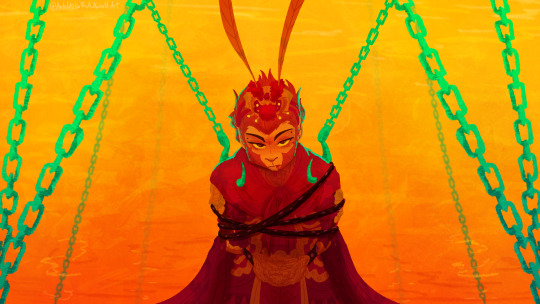
锁骨
#journey to the west#jttw#xiyouji#sun wukong#monkey king#visual development#AAAAA ITS BEEN SO LONG SINCE IVE DONE A PROPER PIECE FOR JTTW....#translation is clavicle but its directly 'lock bone'-#-because in stories you can immobilize someone by putting something through that hole in it#I think its such a super cool bit of imagery I wish more jttw media made use of it....#also sorry if you can tell I gave up rendering the body and only really did the face- im tired GFJDKDDD#gonna go do those zhuhou request doodles now :3#also sorry Taishang Laojun's diamond snare looks boring- I wanted to focus on the hooks and chains#blood tw#addition
1K notes
·
View notes
Text
LMK VS Legend
Yin and Jin
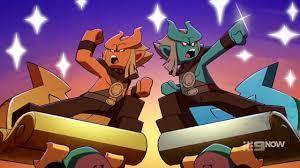
LMK: Silver and Gold Demons Two trouble-making demons. Known thieves, former Speedy Panda owners, and lovers of the dramatic. Both are constant annoyances to the Monkie Kid and the crew. I wonder who the assistant is to them she seems to be in to much control to be a minion.
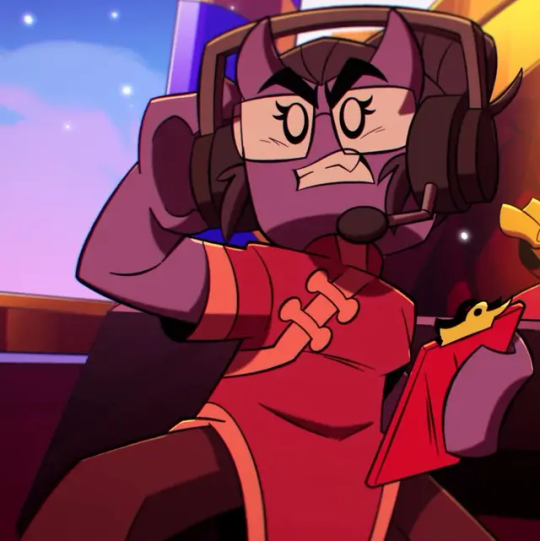
JTTW
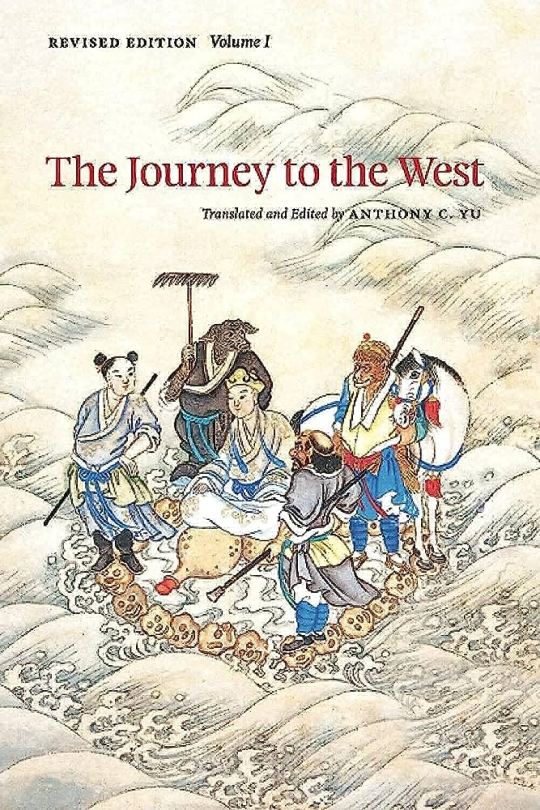
Formally Silver Boy and Gold Boy the two were servent boys of Taishang Laojun and given the job of watching over his furnaces.
In the novel, Jin is the older brother and Yin is the younger one.
They escaped to the mortal realm and moved to Flat Peak Mountain and took Laojuns' five sacred items. The Purple Gold Red Gourd, Suet Jade Flask, Golden Cloth Rope, Seven Stars Sword, and Palm Leaf Fan. When they met the pilgrims they captured all of them except Wukong and instead threw three mouantins on him. They sent two minions to go capture the monkey, but that was foiled due to Wukongs' escape and tricking them into giving them two of the sacred items.
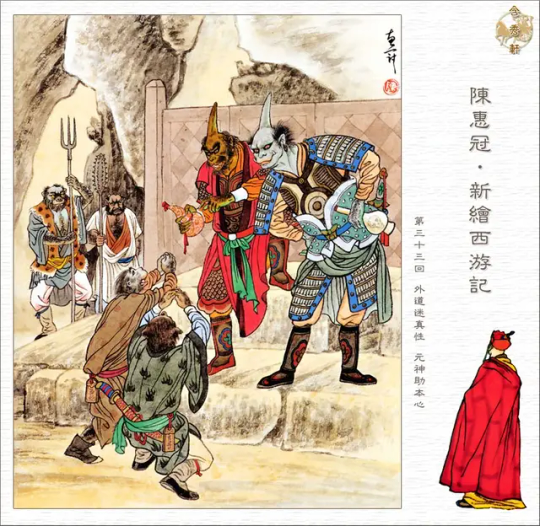
Enraged, they send other minions to invite their godmother The Nine-Tailed Vixen. Finding this out Wukong goes and kills the two minions and the Vixen, designing himself as her he was nearly convincing except for Bajies' blunder. The two trapped the monkey in the gourd but he tricked them and escaped. that repeated another time when with monkey tested ut the gourd's power by faking another identity and using a fake name. After the second time, Wukong swapped the four for a fake one. He challenged the Silver King and tricked him into the gourd. The Gold King led his army to avenge his brother but his army was killed by Wukong. He fled to Dragon Supressing Cave and along with his uncle Hu A’qi, and his uncle's amry set out again to avenge his brother and Hu A’qis' sister. His uncle was killed by Bajie and his army was killed by Wukong. The Monkey King finally ended it when he trapped the Golden King in the gourd. Before the pilgrims could continue they were stopped by Laojun and explained the two orgina claimed back the sacred items and took the boys back to Heaven.
Thoughts:
I got to wonder what the family tree is like in the family in this universe.
21 notes
·
View notes
Text
☯📜🙏 On the 15th day of the lunar second month, it's the birthday of Taishang Laojun, the #SupremeVenerableSovereign, one of the #ThreePureOnes of #Taoism. May all things in life be as you wish, following the natural way of the world.
🔮 Zi Wei Dou Shu (紫微斗数), also known as Purple Star Astrology, is a traditional form of Chinese astrology that is based on the position of stars at the time of a person's birth. Learn more at https://ngocnga.net/read-your-chinese-astrology-zi-wei-dou-shu/?utm_source=tumblr&utm_medium=social&utm_campaign=ziwei
#ziweidoushu#zwds#purplestar#purplestarastrology#chineseastrology#astrology#metaphysics#chinesemetaphysics#太上老君#Harmony#NaturalLaw
1 note
·
View note
Text

西遊記-
96- Daode Tianzun 道德天尊/ Taishang Laojun 太上老君
#art#drawing#doodle#fanart#journey to the west#西遊記#Daode Tianzun#道德天尊#Taishang Laojun#太上老君#100 journey to the west#三清
5 notes
·
View notes
Photo



This soft pan out was very interesting. I think...I think maybe this is the lid of the Bagua Lu/ Eight Trigrams Furnace.
What if the lid got blasted off and fell to earth and it’s just. Been there, on that mountain, all this time.
#Journey to the West#Black Myth: Wukong#only a theory because it could be anything -- but doesn't it look like the huge lid to something#something like Taishang Laojun's bagua furnace???!! Don't remember if the furnace was ever fixed or etc#I love these little bits of continuity -- didn't the contents of the spillage get dunked on a mountain somewhere and it#became the Fire Mountain/ huoyan mountain?#insane jttw details where the havoc in heaven caused genuinely insane mortal world consequences all over china#黑神话#黑神话:悟空#西游记
38 notes
·
View notes